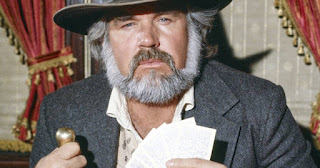Gambling Rules
(Adopted from Knave 2E)
I love the gambling rules that Ben Milton cooked up for Knave 2E. However, I wanted to give them just a little more depth. I’ve added rules for handling characters who are skilled at gambling (card sharps, riverboat gamblers, and the like) as well as cheating.Basic Rules of Gambling
 |
| Know when to roll 'em... |
The player wagers an amount of money (up to the house limit). The House (GM) rolls 1d6.
The player then decides to either bow out (losing half their wager) or try to roll 1d6 and beat the House’s roll.
If the player rolls and succeeds, they win an amount equal to their wager. If they roll equal to or less than the House’s roll, the player loses their wager.
Gambling Skill
A skilled gambler (based on a feat or similar mechanic) has a slightly better chance of beating the house. When rolling, the player rolls 1d4 in addition to the normal 1d6.
If either of these dice rolls are greater than the House’s roll, the player wins an amount equal to their wager.
Cheating (Optional)
The GM might consider letting a character cheat. A cheating character may re-roll their d6 immediately after rolling it (and comparing it to the House’s roll). A cheater may reroll once per wager.
However, if the re-roll exactly matches the House’s roll, the character has been caught cheating!
Note: You might allow a cheater a Saving Throw, Dexterity check, or similar means of evading detection once caught.
Probability
If my simple simulations are correct, player’s have about a 42% chance to win each wager (assuming they always roll against the House). These odds are similar to the odds of winning a hand of Blackjack.
Gambling skill improves a player’s chances of winning to about 48%. This feels about right for a professional gambler. Odds are still in the favor of the House, but not by much.
Cheating gives the player a 58% chance of winning each hand. However, they have a 16% chance of getting caught each time they cheat. Note that this isn’t completely accurate, as no one player would cheat if the House rolls a 6 (since the best they could hope for is getting caught). I’m not especially motivated to calculate the actual odds at this moment, but I might do so if I ever revisit and expand these rules.




No comments:
Post a Comment